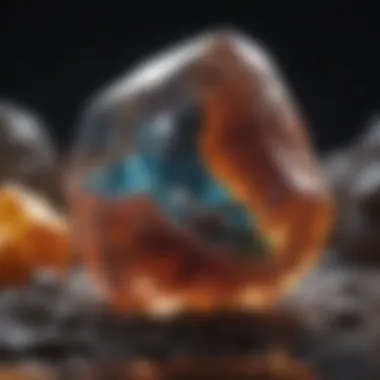Exploring the Rock Zodiac Sign: A Comprehensive Insight


Intro
The exploration of the rock zodiac sign reveals a rich tapestry of intersections between geology and astrology. This unconventional approach invites individuals on a journey to understand how the characteristics of minerals correlate with traditional astrological signs. As we delve deeper into this concept, we uncover not only the unique attributes of various rocks but also their implications for personal and spiritual growth.
In this section, we will outline some foundational astrological concepts. These principles create a backdrop against which the rock zodiac can be fully appreciated. Understanding these elements offers valuable context, enhancing our engagement with the topic.
Astrological Concepts
Definition of Key Terms
Astrology often relies on a set of specific terms that form its lexicon. In this context, terms like zodiac, aspects, houses, and elements play crucial roles. A zodiac sign refers to one of the twelve segments of the celestial sphere. Each represents different personality traits and influences. Aspects are the angles between planets that provide deeper insights into individual behaviors. Houses denote different areas of life affected by planetary positions, and elements categorize signs into groups like fire, earth, air, and water.
Historical Background of Astrology
Astrology has roots that stretch back thousands of years. Early civilizations utilized celestial observation to predict seasonal changes and guide agricultural practices. The Babylonians are credited with creating one of the first forms of astrological belief systems. Over time, diverse cultures adapted these beliefs. For example, the Greeks refined astrology, integrating it with their philosophical views. Today, astrology continues to evolve, influenced by modern thought and scientific inquiry.
Overview of Different Astrology Branches
Astrology is not monolithic; it encompasses various branches, each with its own methodologies. Natal astrology focuses on individual birth charts, interpreting personal traits and life paths. Mundane astrology examines world events, predicting social and political change. Elective astrology assists in making significant decisions, while horary astrology seeks to answer specific questions by analyzing celestial positions. Each branch brings a different layer of insight, making the study of astrology a multifaceted endeavor.
Rock Zodiac Sign Exploration
This connection between minerals and zodiac signs opens up new avenues for exploration. Each sign resonates with particular rocks, which evoke the energy of the sign and influence various aspects of life.
Foreword to the Rock Zodiac Sign
The concept of the Rock Zodiac Sign is an intriguing addition to the expansive field of astrology. This approach associates unique minerals and geological elements with traditional zodiac signs, opening a new dimension for spiritual exploration and self-discovery. Understanding the Rock Zodiac provides a fresh perspective to both seasoned astrologers and newcomers alike, enabling them to deepen their connection to the cosmos.
In this section, we will explore several essential elements surrounding the Rock Zodiac Sign. The idea of linking specific rocks to astrological signs transcends mere symbolism; it offers insights into one's character and potential. This provides a direct way to incorporate geological wisdom into personal and spiritual practices.
The benefits of engaging with the Rock Zodiac include improved self-awareness and a new tool for introspection. Individuals can reflect on how a particular mineral resonates with their personality traits or life circumstances. Furthermore, understanding these connections can lead to better emotional regulation and enhanced well-being.
It's essential to consider the historical context of the Rock Zodiac, as it has roots in ancient traditions. This gives a richer significance to the rocks and minerals selected for each sign. As we delve deeper, the interplay between earthly materials and heavenly bodies becomes more evident. The unique attributes of each mineral can illuminate aspects of our lives that may not be easily understood through conventional astrology alone.
Overall, the Rock Zodiac Sign presents a multifaceted way to view one's astrological profile. It serves as a bridge connecting the metaphysical properties of rocks with astrological insights. This exploration can enrich not only personal growth but also the broader understanding of how different elements interact within the framework of astrology. This makes the Rock Zodiac a topic worth examining closely.
Understanding the Basics of Astrology
Understanding the basics of astrology is foundational to grasping the concept of the rock zodiac sign. Astrology has long been regarded as a bridge between the celestial and the terrestrial. By exploring this connection, one can appreciate how celestial movements influence human behavior and natural events on Earth. This exploration highlights the significance of various components within astrology, such as planets, houses, and signs. Each element interlinks, creating a framework through which individuals can interpret their personal experiences.
Astrology helps in self-discovery and personal growth. People often seek insights for life decisions, emotional understanding, or to navigate relationships. The rock zodiac sign, which aligns rocks with astrological signs, enhances this journey. It brings an additional layer of meaning, focusing on the earthly realm while connecting to celestial influences. This unique integration allows for finding strength, healing, and guidance through specific minerals.
As one delves deeper into astrology, it becomes essential to consider its historical context and the role celestial bodies play within the astrological framework. Every astrological concept, including the rock zodiac, is steeped in traditions that have evolved over centuries. These developments shape the current interpretations and insights practitioners use today.
The Historical Context of Astrology
Astrology has roots that trace back thousands of years, encompassing a tapestry of cultures and philosophies. Ancient civilizations like the Babylonians and Egyptians meticulously observed celestial patterns. They assigned meanings to stars and planets, establishing a correlation between the cosmos and human affairs. In Hellenistic times, astrology matured, influencing various philosophical schools of thought. This period set the groundwork for Western astrology as we know it today.
During the Middle Ages, astrology faced both acceptance and skepticism. However, it persisted through the Renaissance when scholars sought knowledge that blended science and mysticism. Astrology’s continuous evolution demonstrates its adaptability and relevance in diverse societies.
The Role of Celestial Bodies
Celestial bodies are pivotal in astrology. Each planet is believed to embody energies and traits that influence people's lives. For instance, Mercury governs communication, while Venus relates to love and beauty. In addition to planets, the sun and moon hold significant positions. The sun represents one's core self, while the moon embodies emotions and intuition.


Astrology also recognizes the importance of angles and aspects formed between these celestial bodies. The relationship between these elements guides astrologers in generating birth charts and interpretations.
Understanding how celestial bodies interact creates a deeper appreciation for how the rock zodiac sign fits into this framework. Each rock aligns with specific astrological influences, providing objective connections that can enhance personal insight and personal well-being.
The connection between celestial bodies and earthly representations in the rock zodiac is a modern interpretation that offers unique insights into personal growth and healing.
Concept of the Rock Zodiac Sign
The concept of the Rock Zodiac Sign constitutes a unique intersection of geology and astrology. It proposes an innovative perspective by linking each astrological sign with specific rocks and minerals. This idea opens new avenues of thought when it comes to understanding personal traits and destinies in relation to both their astrological sign and the characteristics of corresponding rocks.
Recognizing how these minerals relate to astrological attributes allows individuals to explore their personalities at a deeper level. It adds a tangible element to the often abstract nature of conventional astrology. By incorporating these rocks, practitioners may find practical tools to reflect on their experiences and journeys. This approach may appeal to those interested in alternative methods of self-exploration.
Defining the Rock Zodiac
Defining the Rock Zodiac involves understanding how various minerals correspond to each sign. Each sign has particular traits, and the associated rocks echo these qualities through their own properties. For instance, Aries, represented by the Fiery Stone, embodies enthusiasm and adventure, paralleling the energized nature of red jasper, often linked with courage.
This zodiac framework emphasizes that each rock carries its own energy and characteristics. People may use this framework to align their actions with the qualities of their gemstone. Consequently, such a dual-focus approach can enhance self-awareness and personal growth.
Historical Origins of the Rock Zodiac Concept
The historical origins of the Rock Zodiac concept can be traced back to various traditions that sought to connect gemstones with astrological understanding. Ancient cultures often admired rocks and minerals, attributing spiritual significance to them. For example, many civilizations utilized crystals in rituals and as talismans, believing they had inherent powers that resonated with astrological signs.
Throughout history, the integration of astrology and geology has evolved. In modern contexts, the concept has gained renewed interest among enthusiasts of metaphysical studies. This resurgence reflects a broader trend where exploration of personal connections to natural elements is embraced within spiritual and holistic practices.
The Rock Zodiac Sign serves as a reminder that the universe offers multi-faceted tools for understanding ourselves and our place within it, bridging ancient wisdom with contemporary insights.
In summary, comprehending the Rock Zodiac enhances our understanding of both astrology and geology. This unique concept offers individuals tools to achieve insight into their lives, encouraging a personal connection rooted in the elemental world.
Zodiac Signs and Corresponding Rocks
The intersection between zodiac signs and rocks offers an engaging way to understand personal characteristics and traits. Each zodiac sign relates to specific rocks that embody certain qualities, serving as an extension of astrological insights. By exploring these connections, individuals can glean deeper insights into themselves, enhancing their self-awareness and personal growth.
Aries: The Fiery Stone
Aries, represented by the ram, is known for its fiery spirit and assertive qualities. The stone associated with Aries is often regarded as the bloodstone. This mineral is believed to enhance courage and vitality, mirroring the energy of Aries. Bloodstone is thought to boost confidence, making it fitting for those born under this sign.
Taurus: The Grounded Gem
Taurus individuals value stability and comfort. The rock often linked to Taurus is emerald, a stone that symbolizes growth and abundance. Emerald's calming energy resonates with the grounded nature of Taurus, promoting patience and loyalty. Wearing or carrying emerald may assist Taurus in achieving emotional balance.
Gemini: The Versatile Mineral
Gemini, represented by the twins, embodies duality and adaptability. Agate is the corresponding rock for Gemini. Known for its versatility, agate is believed to enhance communication and clear thinking. This stone fosters relationships, complementing Gemini's social nature and dynamic intellect.
Cancer: The Nurturing Rock
Cancer individuals are recognized for their nurturing tendencies and emotional depth. Moonstone, the stone associated with Cancer, symbolizes intuition and healing. Moonstone is often said to amplify emotions, aiding in empathetic understanding. This nurturing crystal encourages Cancer to embrace their sensitivity and compassion.
Leo: The Regal Crystal
Leos are known for their charisma and leadership qualities. The stone that corresponds with Leo is citrine, often referred to as the merchant's stone. Citron's warm energy is said to foster confidence and creativity, aligning with the regal characteristics of Leo. This crystal encourages self-expression and positivity.
Virgo: The Precise Stone
Virgo represents meticulousness and discernment. The stone linked to this sign is sardonyx. This mineral enhances critical thinking and organization, which are key traits of Virgos. Sardonyx is believed to promote clarity, helping Virgos make informed decisions.


Libra: The Harmonizing Gem
Libra seeks balance and harmony. The rock associated with Libra is lapis lazuli, a stone revered for its calming effects. Lapis lazuli fosters peace and communication, aligning with Libra's desire for relationships. This gem encourages self-reflection, aiding Libra in maintaining balance in their lives.
Scorpio: The Transformative Mineral
Scorpios are often characterized by their intensity and transformative nature. The related stone for Scorpio is garnet, known for its energizing properties. Garnet is believed to encourage passion and healing, mirroring the transformational aspects of this sign. This stone aids Scorpios in embracing their inner strength.
Sagittarius: The Adventurous Rock
Sagittarius individuals are known for their adventurous spirit and pursuit of knowledge. The stone associated with Sagittarius is turquoise. This mineral symbolizes exploration and wisdom. Turquoise is said to enhance communication, aligning with Sagittarius's love for travel and discovery.
Capricorn: The Enduring Stone
Capricorn is characterized by ambition and determination. The stone that correlates with Capricorn is onyx. Onyx is known for its grounding qualities, promoting endurance and resilience. This stone supports Capricorn's pursuit of their goals, helping them remain steadfast in their endeavors.
Aquarius: The Innovative Gem
Aquarius individuals are often seen as innovators. The rock connected to them is amethyst. This stone is known for its calming yet stimulating energy, aligning perfectly with Aquarius's forward-thinking nature. Amethyst helps to open the mind, encouraging creativity and enlightenment.
Pisces: The Mystical Crystal
Pisces are known for their intuitive and artistic qualities. The stone associated with Pisces is aquamarine, symbolizing tranquility and clarity. Aquamarine is believed to promote compassion and emotional understanding, supporting Pisces in their mystical pursuits and connections.
Each zodiac sign carries unique traits that enhance personal growth when associated with specific rocks. Understanding these connections can provide valuable insights.
In summary, by diving into the relationship between zodiac signs and their corresponding rocks, individuals can enrich their astrological practices while gaining a deeper appreciation for the nuances of their own personalities.
Metaphysical Properties of Rocks in Astrology
The metaphysical properties of rocks play a significant role in understanding the connections between astrology and geology. Each rock is believed to hold unique energy patterns that resonate with the celestial bodies and influence human experiences. This relationship enhances the significance of the rock zodiac. By studying the metaphysical aspects of rocks, one can better grasp how these natural elements shape our perspectives and behaviors. These properties often contribute to personal and spiritual growth, making the incorporation of rocks into daily life valuable.
Healing Properties of Rocks
The healing properties of rocks are central to many esoteric practices. It is thought that certain minerals can aid physical, emotional, and spiritual healing. Here are notable rocks and their described healing properties:
- Amethyst: Often associated with tranquility, amethyst is said to help with stress relief and anxiety reduction.
- Rose Quartz: This pink stone is linked to self-love and emotional healing, fostering compassion and harmony.
- Clear Quartz: Considered a powerful amplifier of energy, clear quartz is believed to boost mental clarity and enhance healing when combined with other stones.
These rocks, among many others, are used for healing by placing them on specific body locations or carrying them throughout the day. However, it is essential to approach these claims with caution. Healing properties can vary greatly between individuals, and personal experiences should guide one's selection of rocks for healing purposes.
Rocks and Emotional Well-being
Rocks can also have profound effects on emotional well-being. Their intrinsic energies are thought to interact with human emotions and mental states, allowing for a supportive framework for personal growth. Here are a few ways in which rocks can contribute to emotional health:
- Grounding Effect: Many rocks help individuals stay grounded, minimizing feelings of anxiety and panic.
- Focus Enhancement: Certain stones, such as fluorite, are believed to help clarify thoughts and improve focus.
- Mood Stabilizers: Rocks like jade and aventurine may promote emotional balance and reduce emotional volatility.
In summary, utilizing the metaphysical properties of rocks can serve as a valuable adjunct to both personal and spiritual development. By integrating these stones into daily routines, individuals may find greater emotional clarity and balance.
Incorporating the Rock Zodiac into Daily Life
Incorporating the Rock Zodiac into daily life offers an innovative way for individuals to connect with their astrological identity. The practice is not merely about recognizing one’s zodiac sign; it involves an understanding of the specific rocks and minerals that resonate with individual characteristics. This can enrich personal practices and offer unique insights into emotional and spiritual well-being. By embedding these stones into everyday routines, a person can create a tangible relationship with their zodiac, enhancing mindfulness and personal growth.
Practical Applications of Rock Zodiac Insights


The insights derived from the Rock Zodiac can be pragmatically applied in various aspects of life. Using these stones as part of daily rituals can promote emotional stability and help in self-discovery. Here are some practical ways to incorporate these insights:
- Personal Affirmations: Carrying a stone that corresponds with one's Zodiac sign serves as a physical reminder of personal strengths and qualities. Say affirmations while holding or visualizing the rock to enhance focus.
- Environmental Integration: Placing rocks in living or workspaces aims to cultivate a certain energy flow. This can enhance creativity, focus, or soothing vibes based on the associated stone.
- Fashion Statement: Wearing jewelry made from zodiac rocks can be a personal style choice that serves also as a therapeutic reminder of one's astrological attributes.
These applications not only affirm one's astrological identity but can also inspire a greater awareness of one’s surroundings and self.
Using Rocks for Meditation and Grounding
Rocks can play a vital role in meditation practices, offering grounding and focus to practitioners. Here’s how to effectively utilize rocks during meditation:
- Selecting the Right Rock: Choose a rock that resonates with your astrological sign. For example, if you are a Taurus, you may choose a grounding stone like jasper. This connection enhances the meditative experience.
- Centering Exercises: Begin your meditation session by holding the rock in your hand. Focus on its texture and weight. This tactile experience can center your thoughts, allowing for deeper introspection.
- Visualisation Techniques: Visualize the properties of the rock as you meditate. Picture yourself absorbing its energy, enhancing your aura, or releasing negativity.
Ultimately, integrating rocks into meditation not only promotes grounding but adds layers of personal significance to the practice. The Rock Zodiac, therefore, offers a distinctive approach to self-awareness and spiritual growth, making it a valuable tool in daily life.
Cultural Perspectives on Rock Zodiac Signs
Cultural perspectives on rock zodiac signs offer valuable insight into how different societies interpret the connection between minerals and astrological influences. Understanding these viewpoints not only enriches our appreciation of the rock zodiac concept but also highlights its relevance across various cultures and traditions.
The exploration of rock zodiac signs emphasizes the significance of geological features in cultural narratives. Many cultures have ascribed meaning to specific stones, viewing them as symbols of strength, protection, or healing. This viewpoint bridges ancient wisdom with modern interpretations, encouraging individuals to forge a deeper connection with the earth.
Additionally, the diverse global practices associated with rock zodiac signs facilitate a more inclusive understanding of astrology. By examining how different cultures incorporate minerals in their astrological frameworks, we reveal a tapestry of beliefs that resonate with personal and spiritual growth.
Being aware of these perspectives can enhance practitioners’ approaches when choosing rocks or minerals to align with their signs. For instance, someone identifying with Taurus might seek out emerald or rose quartz. Recognizing the significance behind such choices can deepen one’s personal practice.
As we navigate through these cultural interpretations, let us be mindful of the respect owed to the traditional practices and beliefs that shape our understanding of minerals in astrology.
Global Interpretations and Practices
Around the world, interpretations of rock zodiac signs vary, shaped by geography, ethnicity, and historical context. For example, in Native American cultures, certain crystals are prized not just for their beauty but for their spiritual properties. These stones are used in rituals and healing practices, often linked with specific zodiac signs, channeling energies that correspond to the individual traits associated with these signs.
In Eastern philosophies, such as those found in Chinese astrology, gems and minerals are aligned with the five elements: gold, wood, water, fire, and earth. This blend of thought influences how followers may view their rock zodiac signs, incorporating a view of harmony that transcends individual stones.
Key points to consider include:
- The significance of local minerals: The interpretation of zodiac signs often relies on available stones in local environments, which adds a unique cultural flavor to each practice.
- Ritual practices: Rituals across cultures can include meditation with rocks, using spices like incense related to certain zodiac signs, and crafting talismans for protection or guidance.
- Community knowledge: Many practices are shared through oral traditions, which help preserve the unique aspects of each cultural interpretation.
Rock Zodiac in Modern Spiritual Movements
Modern spiritual movements often integrate the rock zodiac concept into various practices like crystal healing, meditation, and self-discovery. The blending of the rock zodiac with contemporary spirituality illustrates its adaptability to modern life.
In today's context, practitioners may use specific rocks to manifest intentions or to align energies with their astrological sign. This approach fosters a sense of community among those who believe in the metaphysical properties of minerals while reinforcing personal exploration.
Practices include:
- Crystal grids: Arranging rocks in patterns associated with astrological symbols to enhance spiritual energies.
- Workshops and retreats: Many modern spiritual gatherings incorporate discussions around the significance of various rocks in astrology, allowing participants to explore their connection on a deeper level.
- Social media influence: Platforms like Instagram and Facebook have popularized the sharing of insights related to rock zodiac signs, creating a global community of enthusiasts and practitioners.
The appreciation of rock zodiac signs through various cultural lenses showcases their potential to enrich personal practices and spiritual journeys. As we explore these connections, we emphasize the importance of respect and understanding in engaging with these diverse traditions.
End
The exploration of the rock zodiac sign is not merely an exercise in curiosity; it offers significant insights into the realm of astrology and personal growth. By understanding how different rocks correspond to astrological signs, one can develop a deeper connection to both the natural world and their own astrological identities. This unique fusion enhances the study of astrology, allowing practitioners to incorporate tangible elements into their spiritual practices.
This article has delved into the metaphysical properties of various stones, detailing their energy, healing capabilities, and emotional benefits. Such knowledge empowers individuals to select appropriate rocks that align with their zodiac signs, potentially guiding daily decisions and actions.
Key aspects regarding the rock zodiac sign importance include:
- Cultural Context: Integrating rocks into astrological practices reflects a growing acceptance of diverse methodologies, merging traditional astrology with modern interpretations.
- Practical Application: The practical advice for using rocks in daily life promotes mindfulness and self-awareness. Practitioners can use these minerals for meditation or grounding, facilitating a deeper connection to their spiritual journey.
- Metaphysical Awareness: Understanding the astrological connections of rocks offers a unique lens through which individuals can navigate their emotional landscapes. Recognition of these energies fosters personal growth.
By synthesizing the information presented throughout this article, readers are equipped with a comprehensive understanding of the rock zodiac sign. The intricate relationships between rocks and astrological signs pave the way for innovative practices. This robust exploration not only links generations of astrological study but also calls for further inquiries and explorations into this relatively uncharted territory of astrology. Readers are encouraged to reflect on how the attributes of these minerals resonate within their lives, thus bridging the gap between ancient wisdom and contemporary spiritual practices.
“The rock zodiac sign serves as a reminder of our connection to Earth and the energies that surround us.”







